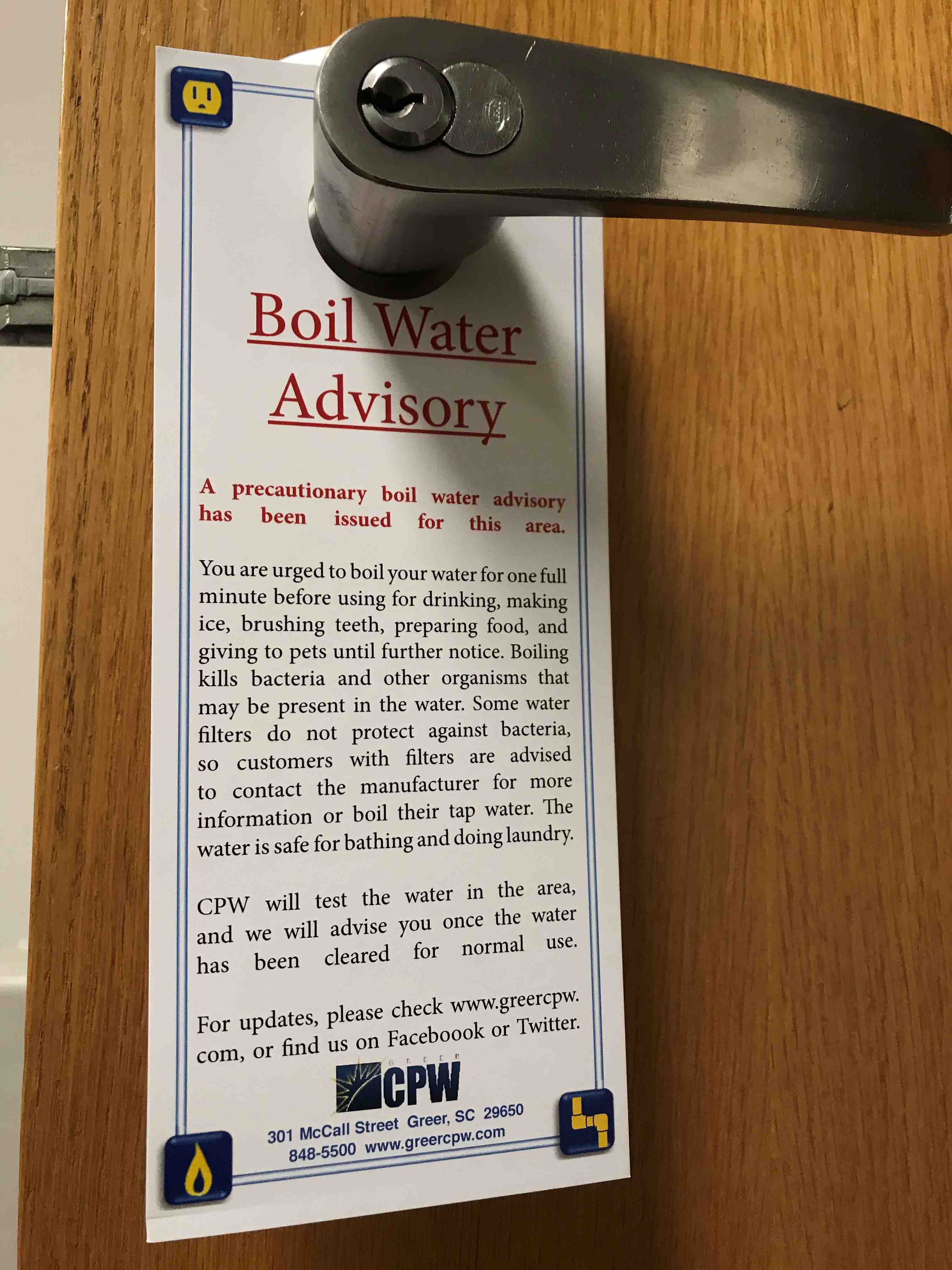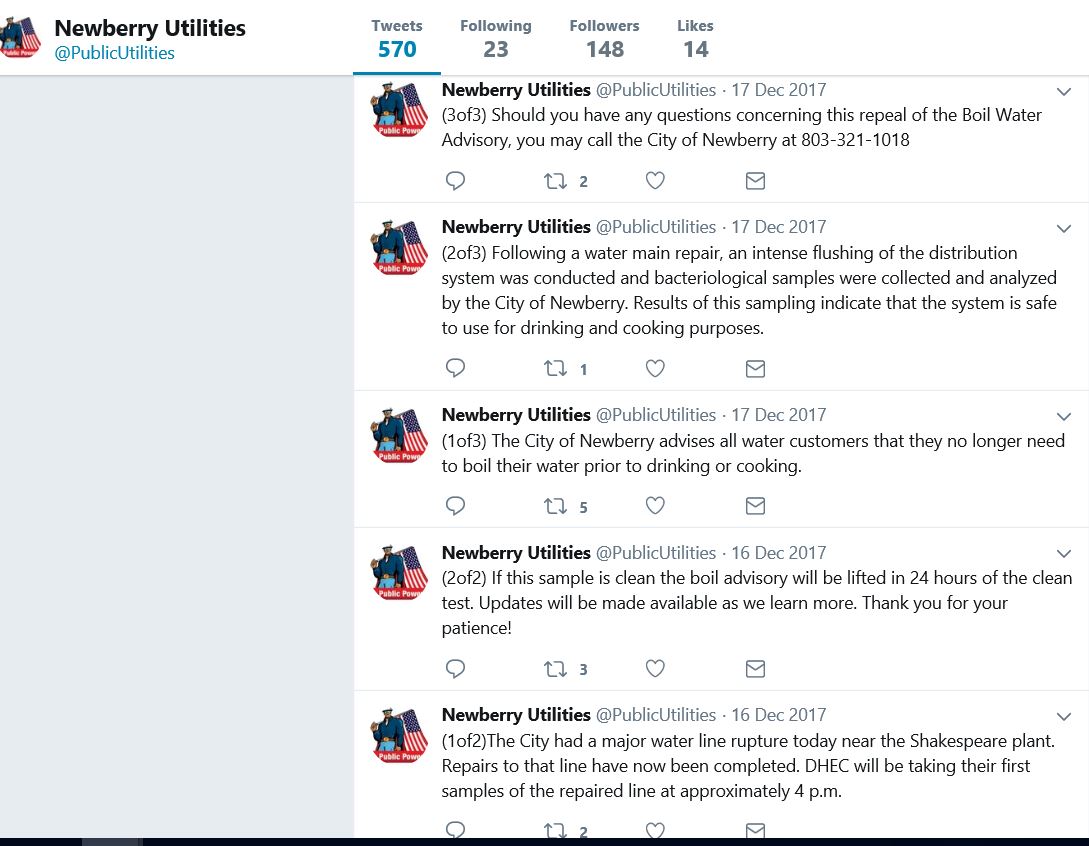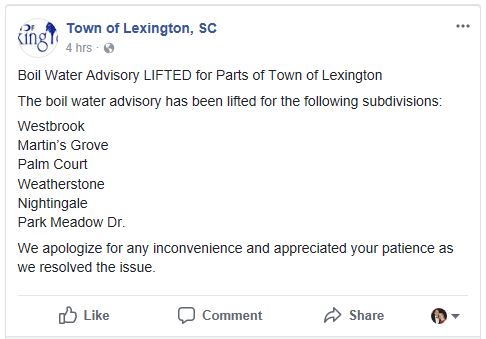Residents assume their tap water is safe to drink. But in the rare instance that it's not — due to a line break, a chemical or petroleum spill, the loss of pressure in a sizeable portion of the distribution system or some other event — municipal officials deliver boil-water alerts wherever residents happen to be and however they are likely to receive it.

The Greer Commission of Public Works uses door hangers and other approaches to update residents on boil-water information. Photo: Greer CPW.
From classic paper door knockers to an array of electronic communication channels to assistance from local news media, municipal officials have their pick of an assortment of tools to tell residents to temporarily suspend their use of the water or to boil it before drinking it.
'Advisory' versus 'notice'
The S.C. Department of Health and Environmental Control's guidance document on boil-water alerts says that the decision to issue a "notice" instead of an "advisory" depends on how certain they are that a water system has been contaminated. If system operators know the water is contaminated — revealed by bacteriological sampling or the occurrence of a waterborne disease outbreak — they send a "notice" because there is a threat to public health. Issuing a boil-water "advisory" is appropriate if officials only suspect that there may have been contamination.
"We are working toward a implementing the app Nextdoor, where we can also send out push notifications to those who are signed up," said Mary-Wallace Riley, grants and communications manager for the City of Clinton. A push notification is a message that appears on a device's screen even when the app is not in use.
"We are in the very baby stages of using it," said Riley, who learned about Nextdoor at a recent American Public Power Conference that focused on connecting with customers.
"The neat thing about it is, we're not pushing things out," she said. "People have to sign up. They want to be informed."
Greer Commission of Public Works uses the mass notification system Everbridge to call customers, in addition to door hangers, Facebook and Twitter.
"This process has worked very well so far," said Greer CPW Public Information Officer Alison Rauch. "However, there is a constant struggle to get homeowners to update their contact number with us."
Like Greer CPW, the City of Columbia sends boil-water advisories through Everbridge. The service sends residents messages about road closures, evacuations, severe weather, missing persons and other news, as part of Columbia/Richland County alerts. It also lists a host of special needs that residents may identify, such as whether they have a wheelchair, oxygen tank, refrigerated medications, chemicals stored on-site, or sight, vision or speech impairments.
The messages go to all landlines in the affected area, but residents can request other ways to receive them, such as via cellphone. City officials also send press releases to local news outlets that include maps of affected areas, push alerts out to the city's social media feeds, and post advisories on Nixle, a platform similar to Everbridge, to send alerts based on subscribers' physical location.
Different avenues
"We have different avenues because everyone receives their information differently," said Jennifer Satterthwaite, utilities communications coordinator for the City of Columbia.
"Some folks rely on the social media feed, while others want personalized calls or messages sent directly to them."
The Town of Batesburg-Leesville uses its website, Facebook and Twitter, CodeRED (community notification system) and direct phone calls and emails to disseminate information if officials know water will be affecting certain businesses and restaurants or organizations, such as schools.
"CodeRED is probably the most effective because we are able to target the specific area impacted," said Seth Duncan, assistant town manager. "The biggest tip I can offer is have a way to issue notices remotely. All of our tools are web based, so I can issue a notice from anywhere in the world, as long as I have an internet connection."
The City of Newberry also uses CodeRED to notify consumers. Residents may sign up for the messages through the city's website, using their home or business address, in order to receive emails, text messages or recorded voice messages, said Elyssa Haven, the city's public information representative. The city uses CodeRED in addition to Facebook and Twitter for a variety of subjects, from festival reminders to boil-water alerts.

The City of Newberry maintains a separate utilities Twitter account to alert consumers to boil-water news, safety tips, photos from tours of its water treatment plant, National Linemen Appreciation Day and other relevant content.
"We can select certain areas within the city to target that location," Haven said. "It has a map feature where I can draw it or use a shape or circle to pinpoint it."
In the Town of Pendleton, Assistant Administrator/Municipal Clerk Amber Barnes said if the affected area is small, town officials distribute door hangers at each residence, post the information to the town website and Facebook page, and email it to residents through MailChimp, an automated marketing platform that sends emails written by town staff to specific audiences at scheduled times. But sometimes all residents need to be reached.
"If it's the entire town, we do all the above plus a reverse 911 call through Anderson County to all residents inside town limits," Barnes said. "We do this when the advisory or notice has been lifted, as well."
Don't forget
While protecting resident health is the immediate, primary concern, local officials should also be aware of all regulatory reporting requirements and the city's legal position.

The Town of Lexington uses Twitter to share information about everything from town events and traffic alerts to police department announcements and boil-water advisories.
Pollution, the presence of harmful substances, is not widely covered by general liability insurance. And the SC Municipal Insurance and Risk Financing Fund may not include liabilities related to a particular type of pollution a city is addressing. So, depending on the causes of action in a possible lawsuit, a city may not have any coverage related to issues with contaminated water and, therefore, could be forced to defend against a lawsuit, said Heather Ricard, director of the Municipal Association's Risk Management Services.
State regulators, too, play another role beyond taking water samples.
South Carolina's State Primary Drinking Water Regulations require public water system operators to inform DHEC immediately if they issue a boil-water notice or advisory, along with a copy of the notice or advisory. The same goes for when a public water system issues a repeal.
